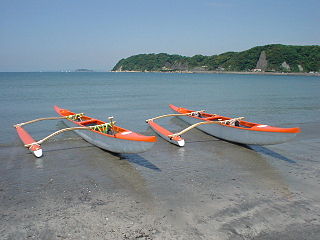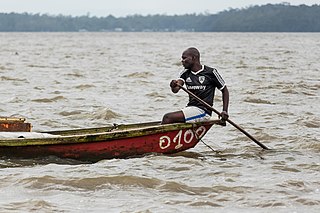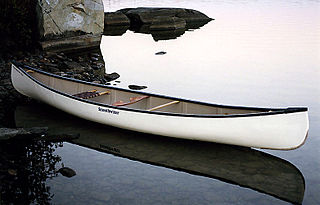
Canoe slalom is a competitive sport with the aim to navigate a decked canoe or kayak through a course of hanging downstream or upstream gates on river rapids in the fastest time possible. It is one of the two kayak and canoeing disciplines at the Summer Olympics, and is referred to by the International Olympic Committee (IOC) as Canoe/Kayak Slalom. The other Olympic canoeing discipline is canoe sprint. Wildwater canoeing is a non-Olympic paddlesport.

Outrigger boats are various watercraft featuring one or more lateral support floats known as outriggers, which are fastened to one or both sides of the main hull. They can range from small dugout canoes to large plank-built vessels. Outrigger boats can also vary in their configuration, from the ancestral double-hull configuration (catamarans), to single-outrigger vessels prevalent in the Pacific Islands and Madagascar, to the double-outrigger vessels (trimarans) prevalent in Island Southeast Asia. They are traditionally fitted with Austronesian sails, like the crab claw sails and tanja sails, but in modern times are often fitted with petrol engines.

Canoe sprint is a water sport in which athletes race canoes or kayaks on calm water.

John MacGregor, nicknamed Rob Roy after a renowned relative, was an English explorer, travel writer and philanthropist. He is generally credited with the development of the first sailing canoes and with popularising canoeing as a sport in Europe and the United States. He founded the British Royal Canoe Club (RCC) in 1866 becoming its first Captain and also founded American Canoe Association in 1880.

A surfski is a type of kayak in the kayaking "family" of paddling craft. It is generally the longest of all kayaks and is a performance oriented kayak designed for speed on open water, most commonly the ocean, although it is well suited to all bodies of water and recreational paddling.

A sprint canoe is a canoe used in International Canoe Federation canoe sprint. It is an open boat propelled by one, two or four paddlers from a kneeling position, using single-bladed paddles. The difficulty of balance can depend on how wide or narrow the canoe is, although regularly the less contact a canoe has with the water the faster it goes. This makes the narrower boats much faster and popular when it comes to racing.
The ICF Canoe Sprint World Championships are an international event in canoe racing, one of two Summer Olympic sport events organized by the International Canoe Federation. The World Championships have taken place every non-Olympic year since 1970 and officially included paracanoe events since 2010; since 2012, paracanoe-specific editions of this event have been held in Summer Paralympic years.

Paddling with regard to watercraft is the act of manually propelling a boat using a paddle. The paddle, which consists of one or two blades joined to a shaft, is also used to steer the vessel. The paddle is not connected to the boat.

Sprint kayak is a sport held on calm water. The paddler is seated, facing forward, and uses a double-bladed paddle pulling the blade through the water on alternate sides to propel the boat forward. Kayak sprint has been in every summer Olympics since it debuted at the 1936 Summer Olympics. Racing is governed by the International Canoe Federation.

Canoe marathon is a paddling sport in which athletes paddle a kayak or canoe over a long distance to the finish line. While the International Canoe Federation states the standard distances are up to 30 km, many races are significantly longer. Many events are raced down sections of river, including currents or portages around obstacles. Some events attract thousands of competitors and are staged over several days.
The 2013 ICF Canoe Sprint World Championships was held 29 August–1 September 2013 in Duisburg, Germany. The championships were awarded originally to Szeged, Hungary, but Szeged was moved to 2011 in the wake of Vichy, France's withdrawal in 2010 and awarded to Rio de Janeiro, who withdrew in September 2012. Consequently, the World Championships were awarded to Duisburg.

The 2014 ICF Canoe Sprint World Championships was held from 6–10 August 2014 in Moscow, Russia.

The following outline is provided as an overview of canoeing and kayaking:
Paracanoe is canoeing for athletes with a range of physical disabilities. The Paralympic version of the sport is governed by the International Canoe Federation (ICF), and a va'a-specific variant is governed by the International Va'a Federation (IVF).
The 2015 ICF Canoe Sprint World Championships, the 41st edition of the World Championships, were held from 19–23 August 2015 in Milan, Italy.
The 2017 ICF Canoe Sprint World Championships, the 43rd edition of the World Championships, were held in Račice, Czech Republic, from 23 to 27 August 2017.
The 2016 ICF Paracanoe World Championships was held in Duisburg, Germany, from 17 to 19 May 2016. This event, which is usually part of the ICF Canoe Sprint World Championships, was held separately as the latter is not held in Olympic years. It shared the venue with, and was held concurrently with the 2016 European Canoe Sprint Olympic Qualifier tournament.
The 2018 ICF Canoe Sprint World Championships, the 44th edition of the World Championships, were held in Montemor-o-Velho, Portugal, from 22 to 26 August 2018.

The women's K-1 200 metres sprint canoeing event at the 2020 Summer Olympics took place on 2 and 3 August 2021 at the Sea Forest Waterway. At least 12 canoeists from at least 12 nations competed.

Canadian is the byname used in some countries for the descendants of the birch bark canoe that was used by the indigenous peoples of Northern America as a convenient means of transportation in the densely forested and impassable areas of Northern America.
 Harry C. Greenshields and A. A. Lindsay (CAN)
Harry C. Greenshields and A. A. Lindsay (CAN) Roy C. Nurse and G. M. Duncan (CAN)
Roy C. Nurse and G. M. Duncan (CAN) K. M. Knight and Harry T. Knight Jr. (USA)
K. M. Knight and Harry T. Knight Jr. (USA) A. A. Lindsay, Harry C. Greenshields, G. M. Duncan, and Roy C. Nurse (CAN)
A. A. Lindsay, Harry C. Greenshields, G. M. Duncan, and Roy C. Nurse (CAN) J. F. Larcombe, K. M. Knight, C. W. Havens, and Harry T. Knight Jr. (USA)
J. F. Larcombe, K. M. Knight, C. W. Havens, and Harry T. Knight Jr. (USA)











